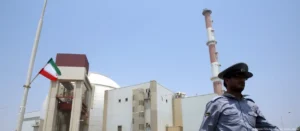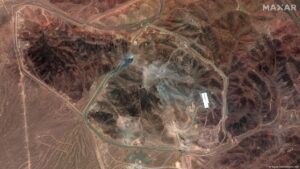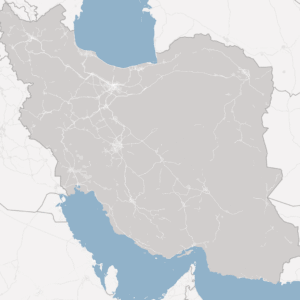Germany, France, and the UK are scheduled to hold nuclear negotiations with Iran in Istanbul on Friday, with significant stakes involved for Tehran.
When representatives from Germany, France, and the United Kingdom meet with their Iranian counterparts in Istanbul on Friday to discuss the future of Iran’s nuclear program, the stakes will be high. A failure in the negotiations could lead to a fresh wave of sanctions against Iran.
Uncertainty still surrounds the current technical status of Iran’s nuclear program following Israeli and U.S. strikes on its nuclear facilities in June. There are even doubts as to whether Iran can continue the program at all.
However, the limited information available does not seem to support U.S. President Donald Trump’s claim that Iran’s nuclear facilities and program have been “totally obliterated,” according to Hamidreza Azizi, an Iran expert at the German Institute for International and Security Affairs.
Azizi believes that Iran would likely be capable of resuming uranium enrichment to some degree in the short to medium term. He also suggests that the country still possesses a substantial portion of the highly enriched uranium it accumulated in recent years.

Uncertainty surrounds the current state of Iran’s uranium enrichment technology.
“Iran has not lost its capability to enrich uranium,” Hamidreza Azizi told DW. “So far, there’s no evidence that Iran has taken active steps to restart the program. However, doing so would depend more on political decisions and military or security considerations than on technical limitations.”
Michael Brzoska, a political scientist at the Institute for Peace Research and Security Policy at the University of Hamburg, offered a slightly different perspective. He believes it has likely become significantly more challenging for Iran to continue enriching its existing uranium to weapons-grade levels.
According to Brzoska, the centrifuges needed for enrichment were likely damaged to the point of being inoperable. “While it’s possible that hidden centrifuges exist at undisclosed locations, there is currently no evidence to support that,” he noted.
What signals are emerging from Tehran?
To increase pressure on Iran, Germany, France, and the UK joined the U.S. in mid-July in setting a deadline for reaching a nuclear agreement. This deadline expires at the end of August. If no deal is finalized by then, the European partners intend to automatically reimpose previous UN sanctions on Tehran.
Brzoska believes it’s entirely possible that Iran’s leadership is rethinking its current approach. While Tehran has consistently denied any intention to pursue a nuclear weapons program, its actions — particularly the enrichment of uranium to high levels — have brought it dangerously close to that threshold, raising concerns among other nations.
Iran is currently sending “mixed signals,” according to Azizi, who told DW that Iranian leaders, including the president and foreign minister, continue to express a willingness for diplomatic dialogue. However, he sees no signs that Tehran is ready to compromise on key issues like domestic uranium enrichment or its backing of non-state actors in the region.
“The leadership appears to be trying to buy time and prevent further escalation while it assesses how to handle the multiple challenges it faces,” Azizi explained.
U.S. Acts Unilaterally with Its Own Sanctions
Iran’s time to maneuver is running out, as the end-of-August deadline approaches. If a deal isn’t reached by then, the UN sanctions that were lifted in 2016 under the Joint Comprehensive Plan of Action (JCPOA), more commonly known as the nuclear deal, could be reinstated.
The agreement includes a “snapback” provision, which allows any signatory — including the U.S., UK, France, China, Russia, Germany, and the EU — to initiate a process that would automatically reimpose all previous UN sanctions on Iran within 30 days.

The U.S. withdrew from the nuclear agreement in 2018 during President Trump’s first term, which means it no longer has the authority to trigger the snapback mechanism. However, mid-July talks indicate that the three European nations have been coordinating closely with Washington.
In the meantime, the U.S. has continued to impose its own sanctions on Iran. These measures target key sectors of Iran’s economy, including oil exports and banking, and also extend to third-party countries and companies that engage in business with Iran.
Is there a mutual interest in reaching a deal?
According to Brzoska, the outcome of the upcoming negotiations is critical for Iran. “While U.S. sanctions are ultimately more impactful from Iran’s perspective, the activation of the snapback mechanism would likely lead many other countries to impose economic restrictions as well,” he explained.
These restrictions would impact areas such as oil exports and the transfer of dual-use technologies—equipment and materials that can be used for both civilian and military purposes. “This gives Iran a strong incentive to prevent the Europeans from activating the snapback mechanism,” Brzoska noted.
However, aside from the option of delaying the snapback process, the three European countries have little else to offer Iran in terms of incentives, Azizi pointed out. This lack of leverage could complicate efforts to reach an agreement.
“The most realistic outcome we can hope for from the upcoming talks,” Azizi said, “is that both sides agree to postpone the deadline for triggering the snapback mechanism, buying more time for diplomacy and the possibility of a negotiated solution.”
